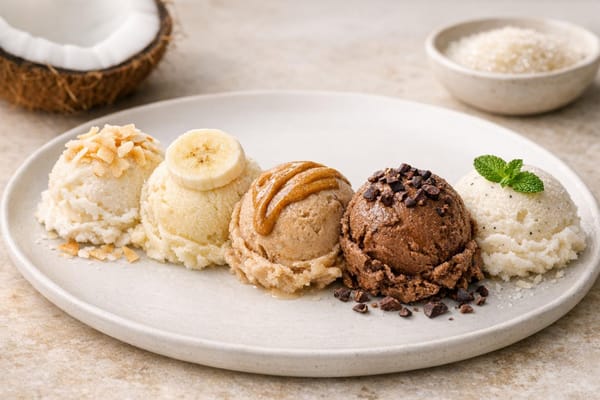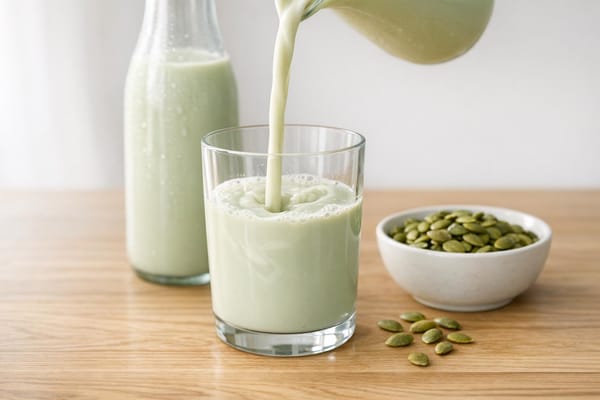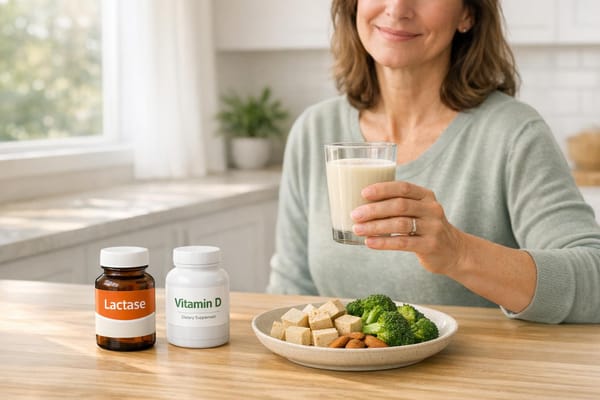Sunflower Seed Milk for Lactose Intolerance
Explore the benefits of sunflower seed milk as a nutritious, lactose-free alternative packed with essential nutrients, ideal for various dietary needs.

Sunflower seed milk is a simple, nutritious, and lactose-free alternative to dairy milk, perfect for those with lactose intolerance or multiple food sensitivities. Made by blending soaked sunflower seeds with water, it’s free of dairy, nuts, gluten, and soy, making it a safe choice for various diets.
Key Benefits:
- Lactose-Free: No bloating, gas, or stomach discomfort.
- Low-Calorie: Only 50 calories per cup, compared to 150 calories in dairy milk.
- Nutrient-Rich: Packed with vitamin E, magnesium, calcium, and iron.
- Allergen-Friendly: Free from common allergens like nuts, soy, and gluten.
- Easy to Digest: Low FODMAP and gentle on the stomach.
Comparison with Other Dairy-Free Milks:
| Milk Type | Calories (per cup) | Protein | Fat | Carbs | Key Nutrients |
|---|---|---|---|---|---|
| Sunflower Seed Milk | 50 | 2 g | 4.5 g | 2 g | Vitamin E, magnesium, omega fats |
| Oat Milk | 120 | 3 g | 5 g | 16 g | B vitamins, fiber |
| Almond Milk | ~40–60 | 1 g | 2.5 g | 1–2 g | Vitamin E, calcium |
Sunflower seed milk’s mild taste and smooth texture make it versatile for coffee, smoothies, baking, and more. Whether homemade or store-bought, it’s a great way to enjoy a lactose-free lifestyle while maintaining balanced nutrition.
Benefits of Sunflower Seed Milk for Lactose-Intolerant People
Naturally Lactose-Free
Sunflower seed milk is a plant-based drink, which means it’s naturally free of lactose. For those who struggle with lactose intolerance, this makes it an excellent alternative to dairy milk. Unlike traditional cow's milk, which can cause bloating, gas, and stomach cramps due to its lactose content, sunflower seed milk provides a smooth, dairy-free option. It’s also a good pick for people with multiple food sensitivities, thanks to its allergen-friendly nature.
Easy on Digestion
Sunflower seed milk is classified as low FODMAP, meaning it contains very few fermentable carbohydrates that might upset the digestive system. This makes it a useful choice for individuals dealing with IBS or sensitivities to FODMAPs. Its lighter texture compared to cow’s milk can also make it easier to digest. Combined with its nutrient-rich profile, these digestive perks make sunflower seed milk a gentle yet nourishing option.
Packed with Nutrients
A single cup (237 ml) of sunflower seed milk offers a range of nutrients. It typically contains 4.5 g of fat, 2 g of carbohydrates, and 2 g of protein, along with about 20% of your daily calcium needs and 6% of your daily vitamin D intake. It’s also a great source of vitamin E, which supports skin health and boosts immunity. Beyond this, sunflower seed milk provides essential minerals like magnesium and selenium. It’s rich in heart-healthy monounsaturated fats and omega-6 fatty acids, which play a role in brain health, metabolism, and maintaining smooth, healthy skin. Its calcium and phosphorus content is particularly helpful for bone health, making it a smart choice for anyone stepping away from dairy products. All these nutrients make sunflower seed milk a strong addition to a balanced, dairy-free diet.
HOW TO MAKE SUNFLOWER SEED MILK 😋 No Straining, No Pulp 💚 Dairy Free + Nut Free Plant Milk Recipe 💚
Sunflower Seed Milk vs Other Dairy-Free Options
When you stack sunflower seed milk against other dairy-free alternatives, its unique qualities become clear.
Nutritional Differences
Sunflower seed milk stands out as a lower-calorie option, offering just 50 calories per cup along with essential nutrients. Compare that to oat milk, which delivers 120 calories per cup, along with 3 g of protein, 5 g of fat, 16 g of carbs, and 2 g of fiber.
Protein content varies widely among plant-based milks. Sunflower seed milk provides 2 g of protein per serving, slightly less than oat milk’s 3 g per cup. However, both pale in comparison to the protein levels in soy milk and dairy options. What sets sunflower seed milk apart is its omega-3 and omega-6 fatty acids, which add an extra nutritional perk.
When it comes to vitamins and minerals, sunflower seed milk is packed with vitamin E and important minerals like magnesium, calcium, and iron. Oat milk, on the other hand, often includes added B vitamins, while almond milk is typically a stronger source of vitamin E. For those prioritizing natural vitamin E - great for skin health and immunity - sunflower seed milk is a smart choice.
| Milk Type | Calories (per cup) | Protein | Fat | Carbs | Key Nutrients |
|---|---|---|---|---|---|
| Sunflower Seed | 50 | 2 g | 4.5 g | 2 g | Vitamin E, magnesium, omega fatty acids |
| Oat | 120 | 3 g | 5 g | 16 g | B vitamins, fiber |
| Almond | ~40–60 | 1 g | 2.5 g | 1–2 g | Vitamin E, calcium |
But nutrition isn’t the only factor. Taste and texture also play a big role in choosing the right dairy-free milk.
Taste and Texture
Sunflower seed milk boasts a smooth texture and mild sweetness, making it a great match for cereals, coffee, and recipes. Oat milk, by contrast, is richer and creamier, while cashew milk is known for its velvety texture. Soy milk has a distinct taste, and coconut milk stands out with its pronounced sweetness.
Its neutral flavor makes sunflower seed milk incredibly versatile - it blends seamlessly into different foods and drinks. Unlike walnut milk, which is thick and carries a strong flavor, or banana milk, which has a sticky, gooey texture, sunflower seed milk keeps things light and approachable.
Another important consideration? Allergies.
Allergen Considerations
Sunflower seed milk is a standout for those with food sensitivities. It’s free from major allergens like dairy, soy, and nuts. This makes it a safe choice for individuals with multiple allergies or for families and institutions that need to accommodate strict dietary restrictions. Unlike nut and soy milks, sunflower seed milk offers peace of mind for those navigating allergen concerns.
How to Use Sunflower Seed Milk in Your Diet
Incorporating sunflower seed milk into your daily diet is simple and versatile. Whether you prefer making it yourself or grabbing a store-bought option, it’s a great addition to meals and beverages. Homemade versions let you control the ingredients and cost, while store-bought options are perfect for convenience.
Homemade vs. Store-Bought Options
Making sunflower seed milk at home is straightforward and gives you full control over what goes into it. Start by soaking 1 cup of raw, unsalted sunflower seeds in water for at least 8 hours. Blend the soaked seeds with 4 cups of filtered water, then strain the mixture through a nut milk bag or cheesecloth. You can customize the flavor by adding a touch of maple syrup, vanilla extract, or even a pinch of sea salt.
For a quicker method, blend 4 tablespoons of unsweetened sunflower seed butter with 4 cups of filtered water, and sweeten to taste.
Store-bought sunflower seed milk, on the other hand, offers a longer shelf life. However, keep in mind that it may contain added preservatives or stabilizers.
Here are a few easy recipes and ideas for using sunflower seed milk in your meals.
Simple Recipes and Usage Ideas
Sunflower seed milk works wonderfully in breakfast dishes, smoothies, and even coffee. For a twist on pancakes, use about 1½ cups of sunflower seed milk in your batter for light, fluffy results with a subtle nutty flavor. It’s also an excellent smoothie base - blend 2 cups of mixed berries with 1 cup of sunflower seed milk, honey, and chia seeds for a refreshing drink.
Plant-based chef Lizzie Pereira recommends a fruity variation: blend ½ cup sunflower seeds with ⅔ cup strawberries, cardamom, and vanilla for a delicious twist.
"Sunflower seeds are a great source of vitamin E, magnesium, and selenium. They have a mild, nutty flavor and are also rich in healthy fats and antioxidants."
– Lizzie Pereira, Plant-Based Chef & Educator
For coffee enthusiasts, try a sunflower milk matcha latte. Whisk 2 teaspoons of matcha powder with hot water, heat 2 cups of sunflower seed milk, and combine the two. If the milk separates, a pinch of sunflower lecithin can help stabilize it.
In baking, sunflower seed milk works as a one-to-one substitute for dairy milk. Use it in recipes like vegan carrot cake without compromising texture or flavor.
Storage and Shelf Life
Proper storage is key to keeping homemade sunflower seed milk fresh. Store it in an airtight container in the refrigerator and shake well before each use.
The shelf life depends on how it’s prepared. Milk made from soaked seeds typically lasts 2 to 3 days, while versions made without soaking can last up to 5 days. On average, homemade sunflower seed milk stays fresh for about 3 to 4 days if stored properly. To extend its freshness, use sanitized equipment and consider boiling the water before blending. Always check for any off smells or unusual texture changes before consuming.
Store-bought sunflower seed milk is shelf-stable until opened. Once refrigerated, it should be consumed within 7 to 10 days. This makes it a convenient option for occasional use, while homemade versions work well for those who enjoy it more regularly.
Clinical Insights and Supplemental Support
Research indicates that sunflower seed milk not only meets nutritional needs but also aids digestion, especially for individuals who are lactose intolerant.
Nutrient Absorption and Health Benefits
With just 50 calories per serving, sunflower seed milk is a lighter option compared to traditional dairy milk. It’s packed with vitamin E, B vitamins, and essential minerals, which contribute to immune health, energy production, and overall cellular function.
Interestingly, lactose intolerance doesn’t significantly affect calcium absorption in adults. When fortified with calcium and vitamin D, sunflower seed milk can help maintain healthy bones. Many commercial versions of this milk include these nutrients, though researchers are still exploring how well non-dairy drinks (except soy-based ones) deliver these benefits. Additionally, the omega-6 fatty acids and monounsaturated fats found in sunflower seed milk support heart health by promoting healthy cholesterol levels and reducing inflammation.
Adding Lactase Enzymes
Although sunflower seed milk is naturally lactose-free, many people with lactose intolerance occasionally consume dairy products. In these cases, lactase enzyme supplements can make a big difference. Globally, about 65% of people are lactose intolerant, and roughly 70% lack sufficient lactase enzymes. For those moments when dairy is unavoidable, enzyme supplements provide a practical solution.
One example is milktab, a lactase supplement delivering 27,000 FCC units of lactase, 22,000 FCC units of protease, and 1,000 FCC units of lipase. This triple-enzyme formula not only breaks down lactose but also helps digest proteins and fats in dairy. It’s vegan, non-GMO, and FODMAP-friendly, making it suitable for various dietary needs.
Typically, lactase doses range between 3,000 and 6,000 international units, taken just before consuming dairy. By combining sunflower seed milk as a daily alternative with occasional lactase enzyme use, individuals can enjoy flexibility in their diets while avoiding uncomfortable symptoms like bloating, gas, diarrhea, or stomach pain. This approach makes it easier for people of all ages to manage lactose intolerance effectively.
Use Across Different Age Groups
Sunflower seed milk is a versatile option for people of all ages dealing with lactose intolerance. Certain groups, such as children and older adults, are more likely to benefit from reliable dairy alternatives.
For children, sunflower seed milk is an allergen-friendly choice. Unlike dairy, soy, or nut-based beverages, it avoids common allergens, making it a safer option. However, parents should ensure their children receive enough protein and calcium for proper growth, as plant-based drinks (except soy milk) often contain significantly less protein than cow’s milk. Fortified versions can help meet calcium needs, though some studies suggest children on lactose-free diets may have lower bone mineral density.
For adults and seniors, sunflower seed milk offers a heart-friendly option with its healthier fat profile and lower calorie count. In the UK, about one in ten older children and adults experience lactose intolerance. Meanwhile, in the United States, 49% of Americans - including 68% of parents and 54% of children - consume plant-based beverages for their perceived health benefits. These trends highlight the growing acceptance of alternatives like sunflower seed milk across all age groups.
To ensure balanced nutrition, individuals should monitor their nutrient intake and choose fortified versions or supplements when necessary.
Conclusion: Using Sunflower Seed Milk for a Lactose-Free Lifestyle
Sunflower seed milk stands out as a practical and nutritious option for those managing lactose intolerance. This dairy-free alternative is packed with nutrients like vitamin E, magnesium, and selenium, while being free of common allergens such as dairy, soy, and nuts.
"Ideal for the lactose intolerant, vegans, or those exploring nutritious options, sunflower seed milk aligns seamlessly with a health-conscious lifestyle."
Its appeal extends beyond nutrition. Sunflower seed milk is also an environmentally friendly choice, requiring much less water to produce compared to almond milk. Its mild, nutty flavor makes it easy to include in everyday meals - think cereal, coffee, smoothies, baking, or even soups. If you make it at home, a touch of sweetener or vanilla can elevate its taste.
For those occasional moments when you crave traditional dairy products, combining sunflower seed milk with lactase enzyme supplements (like milktab) allows you to enjoy treats like pizza or ice cream without discomfort. This approach offers the best of both worlds: a primarily lactose-free lifestyle with the flexibility to indulge.
Sunflower seed milk also shines as an excellent choice for individuals with multiple food sensitivities, offering a safe and nourishing option that doesn’t compromise on taste or versatility.
Whether you're navigating lactose intolerance for yourself or your loved ones, sunflower seed milk provides a dependable, flavorful, and nutrient-rich solution to support a comfortable and balanced lifestyle.
FAQs
How does sunflower seed milk compare nutritionally to oat milk and almond milk?
Sunflower seed milk offers a unique nutritional profile when compared to oat milk and almond milk. A single cup contains about 223 calories, with 18.2g of fat, 8g of carbohydrates, and 6g of protein. For comparison, oat milk typically has 120 calories, 5g of fat, 16g of carbohydrates, and 3g of protein per cup. On the lighter side, almond milk ranges between 40–60 calories, with 2.5g of fat, 1g of carbohydrates, and 1g of protein per cup.
What sets sunflower seed milk apart is its higher fat and protein content, which can make it a more filling option. Oat milk, with its higher carbohydrate levels, provides a quick energy boost, while almond milk is a low-calorie choice, ideal for those keeping an eye on calorie consumption. Ultimately, the right pick depends on your dietary goals and flavor preferences!
What are the health benefits of sunflower seed milk, especially its vitamin E and omega fatty acids?
Sunflower seed milk is rich in nutrients that can boost your health, making it an excellent dairy-free alternative. One standout nutrient is vitamin E, a potent antioxidant that protects your cells from damage, strengthens your immune system, and contributes to radiant skin. Another key component is omega-6 fatty acids, which play a vital role in brain function, skin health, and keeping your metabolism running smoothly.
Adding sunflower seed milk to your diet is an easy and wholesome way to enhance your overall wellness, especially if you're exploring plant-based options instead of dairy.
Can sunflower seed milk replace dairy milk in recipes for cooking and baking?
Yes, you can use sunflower seed milk as a substitute for dairy milk in a variety of cooking and baking recipes. It’s incredibly versatile and works well in dishes like pancakes, smoothies, soups, and sauces, offering a texture and taste that’s quite similar to dairy milk.
On top of that, sunflower seed milk is a nutritious and affordable option, making it ideal for anyone who’s lactose intolerant or sticking to a dairy-free diet. Its mild flavor pairs effortlessly with both sweet and savory recipes, making it a solid alternative for all kinds of culinary creations.



